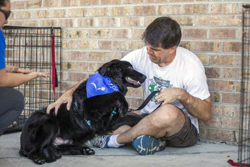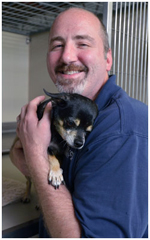Editor’s Note: Animal lover Mimi Pollack today begins a column on animals that initially will run twice a month.
By Mimi Pollack

TIJUANA, Mexico–Life for dogs in Mexico is not very good, except for the lucky ones who have responsible owners. There are so many street dogs roaming about! These street dogs have a very poor quality of life, and because they are not neutered, the problems continue.
However, there are two Jewish brothers, Adam and Josh Prater, who along with Adriana Garcia were inspired to try and make a difference for street dogs in Baja. They found a 50,000 square foot space that was available to them in Tijuana, so Baja Dog Rescue began informally in 2008, and in 2010, it came became a non-profit organization dedicated to rescuing and finding loving homes for homeless dogs.
Although they mostly rescue Baja dogs, they have since grown and now also take in dogs from both sides of the U.S.-Mexico border. They have rescued 300+ dogs.

Both brothers work day jobs and the rest of their time is dedicated to the organization, so they are always on the go. Josh is a chemical engineer and Adam came from a technological, corporate background, but left it because he wanted to make a difference in the world and felt he could do that by working with his brother helping the animals. Today he works as an administrator helping people interface with government programs on a state, local, and federal level. Between their day jobs and Baja Dog Rescue, they basically work 24/7.
Their non-profit organization has a full time hospital/medical center that is open 7 days a week where they take care of the dogs they have at the facility, in addition to about 1,000 dogs externally. This no kill facility is often referred to as “The Sanctuary”.
They have treated over 500 dogs with Parvo with a 90-95% success rate and with distemper with a 75% success rate. They have helped many dogs with various ailments and diseases and even manufacture their own flea, tick, and deworming medication.
Poppy is one such dog. This sweet girl was completely covered in ticks when she was abandoned in front of the facility. As Adam says, “She was more tick than dog.” She was also full of worms and anemic. It was obvious she had been neglected and unloved. The ticks were so bad that she contracted Ehrlichia, a canine typhus.

She is now being cared for and is on the road to recovery and hopefully finding a loving home, but her story is one of many dogs, and the expenses to care for so many dogs continue to go up. This organization relies on donations and the help of volunteers on both sides of the border. They have made great strides in healing sick dogs and have one of the best track records in curing distemper and parvo, but it is hard to keep up that good work when more money is being spent than is coming in.
Baja Dog Rescue now has seven full time employees, and many volunteers, including Cece Vaquera. As Adam stresses, “We truly are a cohesive group doing this and there really is not one person that is more the leader than the other. It really does take a group effort to make this all happen and no one person could do it without the others.”
Indeed, they always need donations and more volunteers are always welcome. Prospective volunteers can email info@bajadogrescue.org for more information.
They have a pet adoption event every Saturday from 10:00 to 3:00 at the PETCO in the Point Loma area of San Diego on Sports Arena Blvd
The problem of homeless dogs in Mexico won’t go away anytime soon, but thanks to organizations like Baja Dog Rescue, and the dedication of all the people that work/volunteer there, at least some of the lucky ones have a fighting chance.
For more information their website is: www.bajadogrescue.org
*
Pollack is a freelance writer based in La Mesa, California. She may be contacted via mimi.pollack@sdjewishworld.com. Comments intended for publication in the space below MUST be accompanied by the letter writer’s first and last name and by his/ her city and state of residence (city and country for those outside the United States.)
